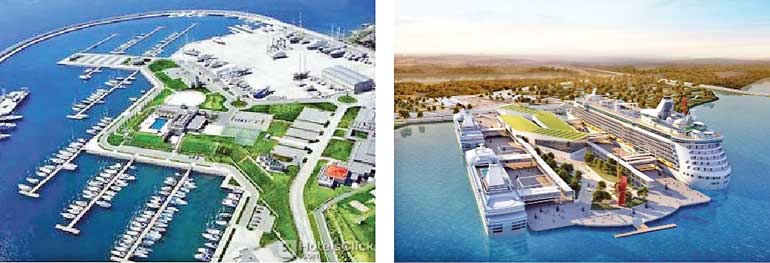- Will discuss reforms needed to increase cruise tourism
- Aims to develop the industry of yacht marinas
The Colombo International Maritime Conference (CIMC) which begins for the second time on 21 September will extensively discuss the reforms that are needed to bring in more cruise and yacht tourism into Sri Lanka as the island has a great potential to increase the high end tourists to the country by developing infrastructure and services to facilitate global cruise tourism.
The cruise and yacht industry in brief
The cruise ship industry has been the fastest growing segment in the travel industry around the world, and since 1980, the average annual growth rate in the number of cruise passengers worldwide has been 8.4%. The cruise line industry from 2016 to 2017, will add 15 more new cruise ships adding 39,637 to worldwide passenger capacity, or 8.1%. The ships from 2015 to 2016 will add $ 3.6 Untitled-2billion in annual revenue to the cruise industry.
The economic benefit
The cruise industry has the potential to provide economic benefits to a port state. These economic benefits arise from five principal sources:
- Spending by cruise passengers and crew
- The shore side staffing by the cruise lines for their headquarters, marketing and tour operations
- Expenditures by the cruise lines for goods and services necessary for cruise operations.
- Spending by the cruise lines for port services.
- Expenditures by cruise lines for the maintenance etc.
However, accommodation of large cruise ships into port requires a great deal of initial capital investment in infrastructure as well as maintenance costs. As cruise ships continue to grow larger, further investment may be required.
Developing ‘niche strategies’ based on their respective natural and historical advantages, and building on what they have to offer gives new opportunity for countries. One such niche sector that offers substantial growth opportunity to these destinations like Sri Lanka and remains relatively untapped is yacht tourism.
Yacht charter industry comprises of various types of yachts, including large, medium and small sized yachts. The global yacht charter market is driven by increasing number of charter destinations, rising disposable income of consumers and efforts by key stakeholders to showcase their offerings. In addition, current developments in yacht, product innovation coupled with latest technologies, will further boost the growth of the global yacht charter market and give opportunity to tourist destination especially in Asia. The global yacht charter market was valued at $ 35.0 billion in 2014 and is expected to reach $ 51.0 billion by 2020. In the recent past The Caribbean countries undertook vigorous efforts towards diversifying their economies in general, and enhancing their tourism sectors in particular. One area identified for specific development is yachting and marina services, a sub-sector which is widely regarded as having significant economic potential.
Our opportunity and the threat
Sri Lanka too has great potential as it is considered one of the most attractive islands in the world for tourism in general and being surrounded by the Indian Ocean and on the main east/west shipping route. The opportunity to expand yachting and cruise tourism is huge, but the down side is the lack of focus, policy implementation, ad hoc decisions and lack of collective approach has made the industry a half-baked cake, which really has failed to get the attention of global players. From airports to ports, customs to immigration, taxis to hotel services, all have to take a dramatic change in Sri Lanka if we are to attract high niche market tourists. It’s not only the infrastructure but the attitude and the skills of people that have to be changed and upgraded to international standards and services.
The country can gain a lot if it diversifies its maritime economy. The Sri Lanka Association of Inbound Tour Operators (SLAITO) has joined CIMC for the second time to push government authorities to execute a development agenda for the country as the respective ministries including tourism have had many policy papers, but actions at the gateways to yacht marinas and cruise tourism is way below expectations. CIMC together with SLAITO will push for a measurable reform process post 2016 Colombo International Maritime Conference. Information related to the conference can be obtained from www.cimc.lk.


